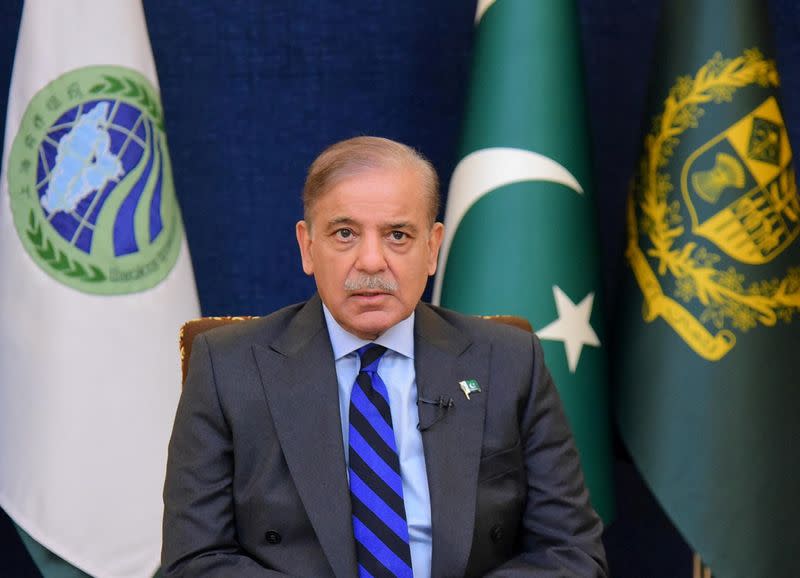Shehbaz Sharif wins Pakistan's top job for second time

- Oops!Something went wrong.Please try again later.
- Oops!Something went wrong.Please try again later.
- Oops!Something went wrong.Please try again later.
ISLAMABAD (Reuters) - Shehbaz Sharif, returning as Pakistan's prime minister for a second time on Sunday when his brother declined a fourth term, has played a crucial role holding together a disparate coalition for 16 months after rival Imran Khan was ousted.
Sharif, 72, won a parliamentary vote for premier, resuming the role he had held until August when parliament was dissolved ahead of last month's elections. Pakistan has had a caretaker government since then.
He was named by his party and coalition allies to head the South Asian nation, despite his elder brother Nawaz Sharif winning a seat in the assembly and being favourite to be sworn in again.
Nawaz Sharif did not want to run a minority coalition government, having had clear majorities in his three previous stints as prime minister, his daughter Maryam said in a post on X.
The brothers' Pakistan Muslim League-Nawaz (PML-N) party won only 80 of the 264 seats up for contest in the elections but was supported by other parties for a majority.
In addition to holding the coalition together after Khan was voted out in 2022, Shehbaz Sharif helped Pakistan secure a last-gasp International Monetary Fund (IMF) bailout last year.
He regained the top job as the PML-N buried differences with the powerful military in the face of their common rival, Khan, who was at odds with top generals over policy differences.
At the time, Nawaz Sharif was in self-imposed exile in London and disqualified from holding public office. He returned to Pakistan in October.
Before his stint as prime minister, the younger Sharif was known more as an administrator than a politician, having served as chief minister thrice in the country's largest province, Punjab.
But as prime minister, he quickly took on the role of peacemaker between coalition parties often at odds with one another over key policies.
Shehbaz Sharif's biggest achievement in his short tenure was clinching the IMF bailout with Pakistan on the brink of a debt default. The deal was signed after Sharif personally called on IMF chief Kristalina Georgieva in June.
However, under his government, inflation touched a high of 38% with record depreciation of the rupee currency - mainly due to structural reforms necessitated by the IMF programme to stabilise the economy.
He blames the economic meltdown on Khan's government, which he says broke an agreement with IMF just before he was ousted. Sharif said his government had to introduce a slew of reforms and scrap subsidies, causing inflation to surge.
KEY CHALLENGES
Pakistan continues to be enmeshed in economic crisis with inflation remaining high, hovering around 30%, and economic growth slowing to around 2%. February inflation dipped slightly to 23.1% from a year earlier, in part due to a high base effect.
Sharif will need to emulate his feat of securing a short-term IMF bailout with the current programme expiring next month and a new extended deal needed to keep Pakistan on a narrow path to recovery.
But his main role will be to maintain ties with the military, which has directly or indirectly dominated Pakistan since independence. Unlike his elder brother, who has had a rocky relationship with the military in all his three terms, the younger Sharif is considered more acceptable and compliant by the generals, analysts say.
For several years, the military has denied it interferes in politics. But it has in the past directly intervened to topple civilian governments three times, and no prime minister has finished a full five-year term since independence in 1947.
Privatising some lumbering state giants, including the national airline, and securing foreign investment will also be key to ease the economic crisis. The Sharis have close ties with rulers in Saudi Arabia and Qatar, which could help in securing investments in several projects Pakistan has lately showcased for sale.
Although defence and key foreign policy decisions are largely influenced by the military, Sharif will have to juggle relations with the U.S. and China, both major allies. He is also faced with dealing with fraying ties with three of Pakistan's four neighbours, India, Iran and Afghanistan.
'WORKAHOLIC'
Sharif was born in the eastern city of Lahore in a wealthy Kashmiri-origin family that was in the steel business. He started his political career as the chief minister of Punjab in 1997 with a signature "can-do" administrative style.
His cabinet members and bureaucrats who have worked closely with him call him a workaholic.
As chief minister, the younger Sharif planned and executed a number of ambitious infrastructure mega-projects, including Pakistan's first modern mass transport system in Lahore.
He was caught up in the national political upheaval when his brother was ousted from the premiership by a military coup in 1999 and he went into exile in Saudi Arabia.
Sharif entered the national political scene when he became the chief of the PML-N after the elder Sharif was found guilty in 2017 on charges of concealing assets related to the Panama Papers revelations.
Married twice, Shehbaz Sharif has two sons and two daughters from his first marriage but none from the second. One of the sons is in politics but the others are not in public life.
His second wife is Tehmina Durrani, the well-known author of "My Feudal Lord", an autobiography about an abusive married life with an earlier husband.
(Reporting by Asif Shahzad, Gibran Naiyyar Peshimam and Charlotte Greenfield; Editing by Raju Gopalakrishnan and William Mallard)

